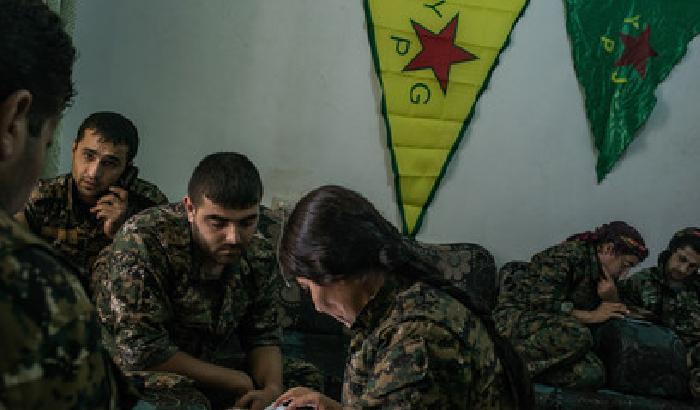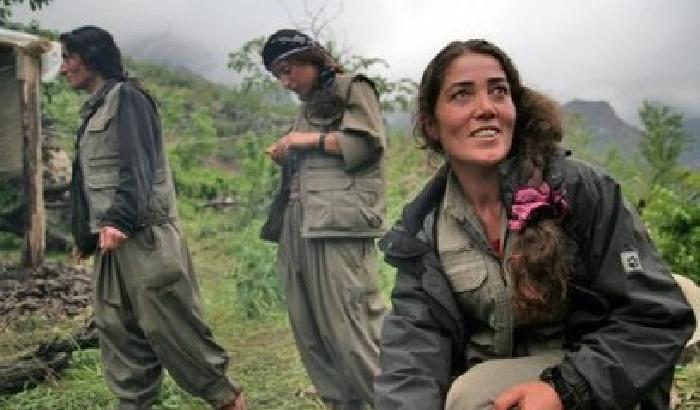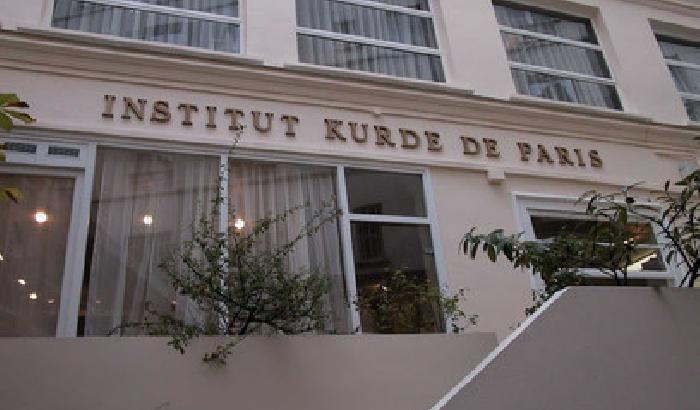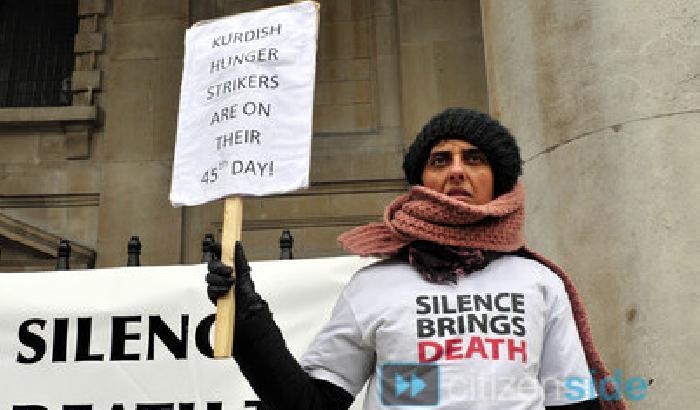Lo stesso giorno che la Turchia ha annunciato di voler aiutare gli Usa a combattere lo Stato Islamico, le forze turche hanno iniziato una campagna di attacco aereo contro uno dei più importanti gruppi curdi che si sono battuti per fermare l’avanzata dello Stato Islamico. La Turchia ha lanciato diverse ondate di raid aerei contro gli elementi di un gruppo separatista curdo noto come Pkk, che è ancora indicato come un gruppo terroristico. Ma quel gruppo, con i suoi alleati in Siria, si batte in prima linea contro l’Isis. L’accordo rivela il groviglio di interessi divergenti nella regione: non si tratta di guerra al terrorismo, ma guerra di predominio.
Ecco il pezzo interattivo del [url”New York Times”]http://www.nytimes.com/interactive/2015/08/12/world/middleeast/turkey-kurds-isis.html?src=twr&smid=tw-nytimes[/url], firmato da SARAH ALMUKHTAR e TIM WALLACE.
Coordinating Against ISIS
Kurdish fighters have been coordinating with the American military since last October. From cloaked rooms in northern Syria, members of the militia known as the Y.P.G. have relayed intelligence and coordinates for potential airstrike targets to an American operations center hundreds of miles away.The resulting strikes have in turn helped the Kurds seize a broad stretch of territory along the Turkish border from the Islamic State. “The role of the coalition jets has been essential to these victories,” said Idris Nassan, a senior Kurdish official from Kobani.

TURKEY
Adana
Incirlik
air base
Gaziantep
Qamishli
Kobani
Jarablus
Kilis
Government
controlled
Tal Abyad
Ras al-Ain
Manbij
Al Bab
Aleppo
IRAQ
Hasaka
Ain Issa
SYRIA
Area
of detail
Raqqa
SYRIA
25 MI
The Y.P.G. is perhaps America’s most effective ally in Syria against the Islamic State. But American officials, though they will broadly acknowledge that they are working with the Y.P.G., take pains not to detail just how closely the forces are working together, given the group’s ties to the outlawed P.K.K.
Kurdish Y.P.G. fighters check maps as they coordinate an airstrike on an Islamic State position in Hasaka.
Mauricio Lima for The New York Times
Allies, but With Conditions
The United States has sought Turkey’s help in the fight against ISIS since last year. Turkey, which has been a NATO member since 1952 and is considered by American officials to be critical to weakening the Islamic State in Syria, was reluctant to participate. Turkey finally agreed to assist, but with some conditions, including the creation of an ISIS- and Kurdish-free zone in Syria on the Turkish border.In return, the United States will be allowed to launch military operations against the Islamic State from Incirlik Air Base and other bases in Turkey “within a certain framework,” according to President Recep Tayyip Erdogan. American officials have been careful not to offend Turkey and have publicly supported its campaign against the P.K.K..In a statement on Twitter, Brett H. McGurk, President Obama’s envoy to the coalition fighting the Islamic State, said, “We fully respect our ally Turkey’s right to self-defense.”

TURKEY
Adana
Incirlik
air base
Gaziantep
Qamishli
Kobani
Jarablus
Kilis
Government
controlled
Tal Abyad
Ras al-Ain
Manbij
Al Bab
Aleppo
Hasaka
Ain Issa
IRAQ
SYRIA
Approximate zone where U.S. and Turkish forces seek to clear ISIS militants.
Area
of detail
Raqqa
SYRIA
25 MI
Suspicion and Violence
Analysts say that Turkey’s decision to join the fight against the Islamic State was driven in part by the threat posed by the Y.P.G.’s rapid territorial gains within Syria. Kurds across the region have historically sought an independent state, which the Turkish government strongly opposes. Mr. Erdogan has said that Turkey “will never allow the establishment of a new state on our southern frontier in the north of Syria.”
For now, Turkey is more actively targeting Kurdish insurgents with the P.K.K. than it is fighters with the Islamic State. In Turkey’s recent roundup of 1,300 people it identified as terrorism suspects, 137 of those arrested were linked to the Islamic State and 847 were linked to the P.K.K. At the same time, Turkey bombed P.K.K. positions in southeastern Turkey and northern Iraq, claiming that the militants could attack Turkish areas from across the border.The Turkish airstrikes effectively ended a two-year cease-fire with the P.K.K. and has set off rounds of protests and clashes between Turkish security forces and Kurdish militants throughout Turkey. In the meantime, Turkish operations against the Islamic State have been slow to develop.Mr. Erdogan’s strategy, according to analysts, is also politically motivated. In June, his party lost its parliamentary majority partly because of the electoral success of a pro-Kurdish party. By bombing the P.K.K., Mr. Erdogan stands to win back votes of nationalists who oppose Kurdish autonomy.

Reuters
Articoli correlati












